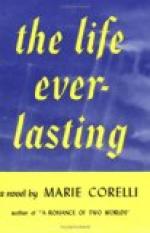“The interest of the place has evidently vanished with Mr. Santoris, so far as you are concerned!” he said—“He is certainly a remarkable man, and owns a remarkable yacht—but beyond that I am not sure that his room is not better than his company.”
“I daresay you feel it so,”—said Mr. Harland, who had for some moments been unusually taciturn and preoccupied—“Your theories are diametrically opposed to his, and, for that matter, so are mine. But I confess I should like to have tested his medical skill—he assured me positively that he could cure me of my illness in three months.”
“Why do you not let him try?” suggested Brayle, with an air of forced lightness—“He will be a man of miracles if he can cure what the whole medical profession knows to be incurable. But I’m quite willing to retire in his favour, if you wish it.”
Mr. Harland’s bristling eyebrows met over his nose in a saturnine frown.
“Well, are you willing?” he said—“I rather doubt it! And if you are, I’m not. I’ve no faith in mysticism or psychism of any kind. It bores me to think about it. And nothing has puzzled me at all concerning Santoris except his extraordinarily youthful appearance. That is a problem to me,—and I should like to solve it.”
“He looks about thirty-eight or forty,”—said Brayle, “And I should say that is his age.” “That his age!” Mr. Harland gave a short, derisive laugh—“Why, he’s over sixty if he’s a day! That’s the mystery of it. There is not a touch of ‘years’ about him. Instead of growing old, he grows young.”
Brayle looked up quizzically at his patron.
“I’ve already hinted,” he said, “that he may not be the Santoris you knew at Oxford. He may be a relative, cleverly masquerading as the original man—”
“That won’t stand a moment’s argument,” interposed Mr. Harland—“And I’ll tell you how I know it won’t. We had a quarrel once, and I slashed his arm with a clasp-knife pretty heavily.” Here a sudden quiver of something,—shame or remorse perhaps—came over his hard face and changed its expression for a moment. “It was all my fault— I had a devilish temper, and he was calm—his calmness irritated me;—moreover, I was drunk. Santoris knew I was drunk,—and he wanted to get me home to my rooms and to bed before I made too great a disgrace of myself—then—that happened. I remember the blood pouring from his arm—it frightened me and sobered me. Well, when he came on board here the other night he showed me the scar of the very wound I had inflicted. So I know he’s the same man.”
We all sat silent.
“He was always studying the ‘occult’”—went on Mr. Harland—“And I was scarcely surprised that he should ‘think out’ that antique piece of jewellery from your pocket last night. He actually told me it belonged to you ages ago, when you were quite another and more important person!”
Dr. Brayle laughed loudly, almost boisterously.




